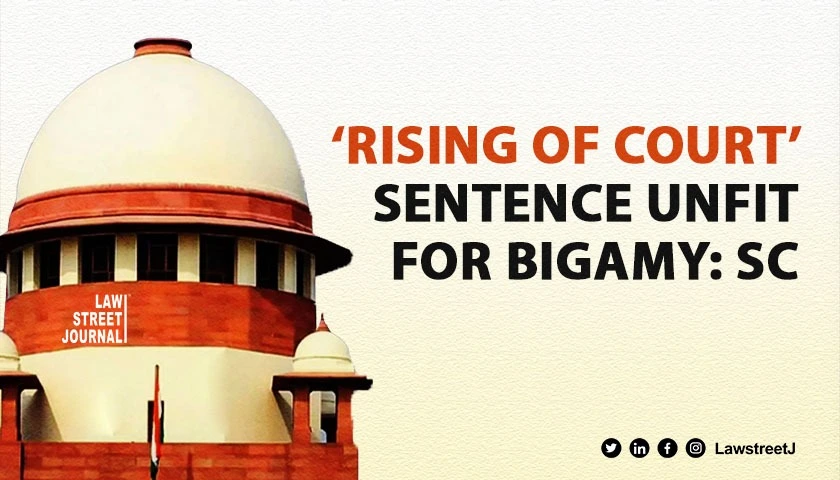NEW DELHI: The Supreme Court has said imprisonment till rising of the court can be imposed for offences wherein no minimum sentence has been prescribed, however, it would not be a proper punishment in case of bigamy, considered as a serious offence.
A bench of Justices C T Ravikumar and Sanjay Kumar said imposition of sentences on offenders must be commensurate with the gravity of the offence as it is not to satisfy the society but it is about the rule of proportionality to promote orderliness.
"In the matter of awarding sentence for conviction of an offence which may impact the society, it is not advisable to let off an accused after conviction with a flea-bite sentence," the bench said.
In the case, the court sentenced a woman and her second husband to six months in jail each for committing bigamy.
Also Read: Can second spouse or their family be sued for bigamy under law? Karnataka HC explains [Read Order]
The issue before the court arose out of a challenge to the validity of the Madras High Court's order, which sentenced the couple to the rising of the court only.
In view of legal provision, the bench said, "The proviso to Section 418(1), CrPC, together with the penal provision under Section 494 IPC, prescribing no minimum imprisonment, but only the maximum, would definitely make imposition of ‘imprisonment till the rising of the court’ intra vires."
However, in the instant case, the bench said the punishment was "unconscionably lenient or a flea-bite sentence”.
In July 15 judgment, the bench said it is the solemn duty of the court to strike a proper balance awarding a sentence proportionate to the gravity of the offence committed by the accused concerned upon his conviction for serious offence.
The court pointed a reading of the provisions would reveal that the legislature viewed the offence of bigamy as a serious offence.
Also Read: Madras HC Upholds Defense of Customary Divorce as Valid in Departmental Proceedings for Bigamy
"Though no minimum sentence is prescribed under Section 494 IPC, the maximum sentence of imprisonment prescribed thereunder for a conviction thereunder is seven years of imprisonment of either description. It is also to be noted that the said offence is compoundable only by the husband or wife of the person marrying with the permission of the Court," the bench said.
In the instant case, the bench, keeping in view of the fact that the couple had a six-year-old child, took a rather compassionate view and adopted a unique form of sentencing for the couple, to ensure that one parent remained with the child while the other is sent behind the bars.
The court ordered the second husband to first surrender to serve his six-month sentence and after the completion of his sentence, the woman is to surrender within two weeks to serve her six-month jail. The bench clarified that this arrangement shall not be treated as a precedent as it was ordered in special circumstances.















